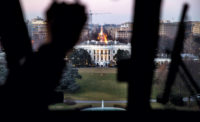Republican lawmakers and the oil and gas industry are ramping up their plans to block newly finalized regulations for hydraulic fracturing—also known as “fracking”—on federal and tribal lands.
Industry advocates say the rules, which wil will be published in the March 26 issue of the Federal Register, are unnecessary and could make work more bureaucratic and expensive for firms in the oil and gas sector.
The Independent Petroleum Association of America (IPAA) and the Western Energy Alliance filed a lawsuit in the U.S. District Court for the District of Wyoming on March 20, just hours after the Interior Dept. released what it called “common-sense” regulations to improve safety and help protect groundwater by updating requirements for well-bore integrity, wastewater disposal and public disclosure of chemicals.
Meanwhile, GOP lawmakers said they planned to block the Bureau of Land Management from implementing the regulations. Sen. James Inhofe (R-Okla.) on March 19 introduced a bill supported by 26 co-sponsors to prevent the new rules from going into effect. “The Obama administration’s rule on hydraulic fracturing adds unnecessary, duplicative red tape that will in turn make it more costly and arduous for our nation to pursue energy security,” Inhofe said in a statement.
House Majority Leader Kevin McCarthy (R-Calif.) said the chamber also will continue “to explore legislative options” on fracking. Last year, the House passed legislation giving states more authority to manage fracking operations on lands within state lines.
Interior Secretary Sally Jewell said in a March 17 speech that the current regulations for fracking on public lands are more than 30 years old and have not kept up with developments in technology. The new rules will increase transparency and improve public confidence that environmental protections are in place, she said.
But Barry Russell, IPAA president and CEO, said in a statement, "These new federal mandates will add burdensome new costs on our independent producers….The agency needs to further engage stakeholders, adequately assess the costs and compare the proposal to the existing safeguards under state law.”
In their legal complaint, IPAA and the Western Energy Alliance said that the regulations are either duplicative of existing state laws or unlawfully "curtail the primary jurisdiction of statement governments."
Environmental groups were also critical of the regulations, saying that they do not go far enough to protect the environment and rely too heavily on FracFocus, an industry-run website where companies voluntarily disclose the chemicals that they use during fracking operations.
Rachel Richardson, advocate with Environment America, said in a statement that “the rule could be worse.” The final version of the regulation is a modest improvement over the original proposal, she said, noting that the final rule restricts the use of open-air pits for storing oil and gas wastewater and tightens standards for well construction.
Still, the final regulations are “bad news for our forests and parks,” she said.



Post a comment to this article
Report Abusive Comment